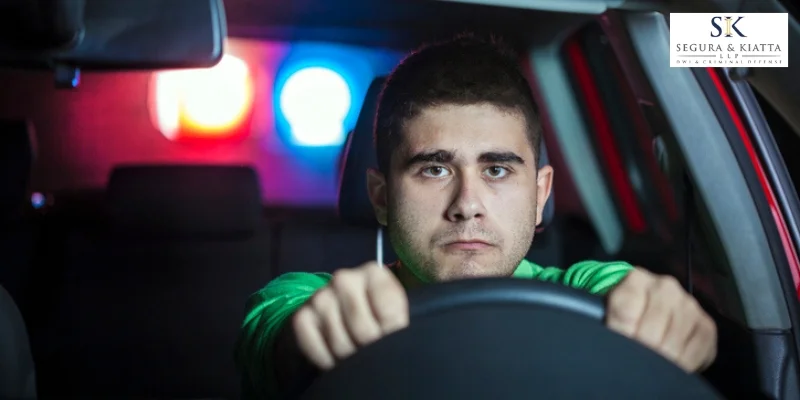|
|
Last Modified on Nov 05, 2025
Do You Really Know What to Do If You Get Pulled Over?
Most people think they know their rights when they are pulled over, but everything changes once those flashing lights appear behind you. Your heart races, and suddenly, you are sitting on the side of the road with a police officer walking up to your window.
If you are pulled over, it is important to know what the police can and cannot do. Because while officers have authority during a stop, that authority has limits. When those limits are crossed, we can often get the evidence thrown out and have your case dismissed.
Let’s talk about what you need to know if you are pulled over by the police in Texas.
What Police Are Allowed to Do When You Are Pulled Over?
When you are pulled over, the police must have something called reasonable suspicion. That means they need a clear reason to believe you committed a traffic violation, such as speeding, running a red light, or having a broken taillight.
Once you are stopped, officers are legally allowed to:
- Ask for your driver’s license, registration, and proof of insurance
- Ask you and your passengers to step out of the vehicle
- Detain you briefly while they investigate the reason for the stop
They can also ask to search your car. But here’s what matters most: you are never required to give consent. If the police do not have a warrant, you can politely say, “Officer, I do not consent to any searches.” That simple statement can protect your rights when you are pulled over the law enforcement.
Pat-Downs, Vehicle Searches, and Probable Cause
There are two main types of searches that can happen during a traffic stop:
- The pat-down search: This occurs when police believe you might be armed or dangerous. They are allowed to quickly pat you down for weapons, but they need reasonable suspicion to justify it.
- The vehicle search: To search your car when you are pulled over, police need probable cause, which is a higher standard. Probable cause means there is strong evidence that a crime has been committed, such as the smell of drugs, visible contraband, or other clear signs of illegal activity. Without probable cause or your consent, police cannot legally search your vehicle.
The Exceptions to the Warrant Rule
Normally, police need a warrant to search your car. However, there are exceptions that sometimes apply. Here are the most common ones:
- Consent: If you give permission, officers can search your vehicle when you are pulled over. This is why it is important to politely refuse.
- Search after arrest: If you are arrested, officers can search you and your immediate surroundings.
- Plain view: If an officer sees something illegal in plain sight when you are pulled over, that gives them probable cause to look further.
- Automobile exception: If police have probable cause but no warrant, they may still search your car because of its mobility.
- Exigent circumstances: The term “exigent circumstances” means an emergency situation. If police believe someone’s life is in danger or evidence could be destroyed, they can conduct a search when you are pulled over.
- Inventory search: If your vehicle is towed after an arrest, police can document its contents.
- Abandonment: If you throw something out the window before you are pulled over, you lose your right to privacy for that item.
What the Police Cannot Do When You Are Pulled Over?
Police have boundaries, and knowing them helps you protect your rights. Here’s what officers cannot do:
- Search your car without consent or probable cause
- Use excessive or unnecessary force
- Pressure you to incriminate yourself
- Discriminate based on race, gender, or any personal factor
If the police cross any of these lines when you are pulled over, your defense attorney can challenge the evidence in court and potentially have it dismissed.
Your Rights During a Texas Traffic Stop
You have specific rights that can make all the difference during a traffic stop.
- Right to remain silent: You must provide your name, license, and insurance, but you are not required to answer questions that could incriminate you. If an officer asks, “Have you been drinking?” or “Where are you going?” you can calmly say, “I prefer not to answer any additional questions.”
- Right to an attorney: If things escalate, politely tell the officer, “I will not answer questions without my attorney present.”
- Right to record: You can record the stop on your phone as long as you do not interfere with the investigation.
- Right to comply without consenting: If you are asked to step out of your car, you should comply, but you can still say, “I do not consent to any searches.”
- Right to challenge the stop: If the stop, search, or arrest was unlawful, your lawyer can challenge it in court.
Common Questions Texas Drivers Ask
Do I have to tell the police if I have a gun in the car?
If you have a handgun license, yes, you must tell the officer when asked. If you do not have a license, you are not required to answer.
Do I have to roll down my window or step out of the car when I am pulled over?
Yes. You should comply with those requests but continue to withhold consent for any search.
What if the stop wasn’t legal?
If the officer did not have reasonable suspicion or probable cause, or failed to follow procedure, your attorney can challenge it and potentially get your case dismissed.
Stay Calm and Protect Yourself
Traffic stops can be stressful, but they do not have to ruin your life. Stay calm, be polite, and remember your rights.
If you have been arrested or charged after being pulled over in Sugar Land or anywhere in Texas, contact Segura & Kiatta Criminal Defense Lawyers immediately. We will review your case, protect your rights, and fight for your freedom.




